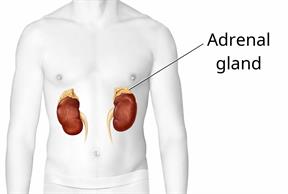Addison's Disease

Addison's disease, which is also called primary adrenal insufficiency, is a condition in which the adrenal glands do not make enough of the hormones cortisol and aldosterone. The two adrenal glands are located above each kidney.
The disease causes blood pressure to drop and causes potassium to build up to dangerous levels. If Addison's disease is not treated, it can suddenly get worse and become life-threatening. This is called an adrenal crisis(addisonian crisis).
What are the causes?
This condition may be caused by:
A disease in which the body's immune system damages the adrenal glands.
An infection of the adrenal glands.
Bleeding (hemorrhage) in the adrenal glands.
A tumor.
What are the signs or symptoms?
Common symptoms of this condition include:
Severe fatigue.
Muscle weakness.
Loss of appetite.
Weight loss.
Darkening of the skin.
Low blood pressure.
Other symptoms include:
Symptoms usually develop slowly and get worse gradually.
How is this diagnosed?
This condition may be diagnosed based on your:
How is this treated?
This condition cannot be cured, but it can be managed with medicines that replace cortisol and aldosterone.
You may need to take these medicines:
Several times a day, by mouth.
Through an injection if you become so sick that you are unable to take these medicines by mouth or you are unable to keep them down.
Illness, stress, and surgery can increase your body's need for cortisol. It is very important that you talk with your health care provider and understand how to adjust your medicine dosages if you become ill or stressed or if you are going to have surgery.
Follow these instructions at home:
Medicines
-
Take over-the-counter and prescription medicines only as told by your health care provider.
-
Know how to increase your medicine dosage during periods of stress, mild illness, or surgery.
General instructions

-
When you travel, carry a needle, a syringe, and an injectable form of cortisol in case of an emergency.
-
In case of an emergency, wear a medical alert bracelet or neck chain so that others understand that you have Addison's disease.
- Carry an ID card that states that you have Addison's disease. The card should include:
Instructions to inject a certain amount of medicine if you are severely hurt or cannot respond.
The name and phone number of your health care provider.
The name and phone number of your closest relative.
-
Keep all follow-up visits. This is important.
Contact a health care provider if:
-
You have a severe infection or other illness.
-
You have severe vomiting or diarrhea.
-
You find it necessary to give yourself injectable medicine.
- You have symptoms of an addisoniancrisis. These symptoms include:
Sudden, severe pain in the lower back, abdomen, or legs.
Severe vomiting and diarrhea.
Dehydration.
Low blood pressure.
Loss of consciousness.
Summary
-
Addison's disease is the inability of the adrenal glands to make hormones that regulate everyday functions of the body.
-
If untreated, this condition can lead to life-threatening problems.
-
It is very important that you talk with your health care provider and understand how to adjust your medicine dosages if you become ill or stressed or if you are going to have surgery.
-
Take over-the-counter and prescription medicines only as told by your health care provider.
-
Keep all follow-up visits. This is important.
This information is not intended to replace advice given to you by your health care provider. Make sure you discuss any questions you have with your health care provider.

